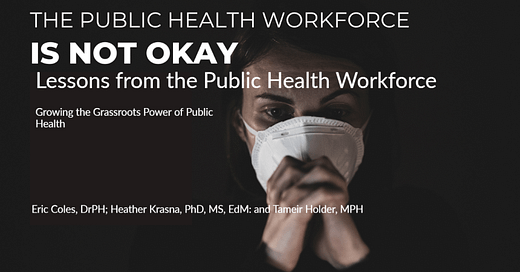Growing the Grassroots Power of Public Health
Eric Coles, Heather Krasna, and Tameir Holder describe the work they're doing to increase awareness and funding for public health activities.
The post Growing the Grassroots Power of Public Health first appeared on JPHMP Direct.
In earlier installments of this column, I have called for more visibility for public health, and emphasized the role of advocacy…
Keep reading with a 7-day free trial
Subscribe to The Public Health Workforce is Not OK to keep reading this post and get 7 days of free access to the full post archives.




